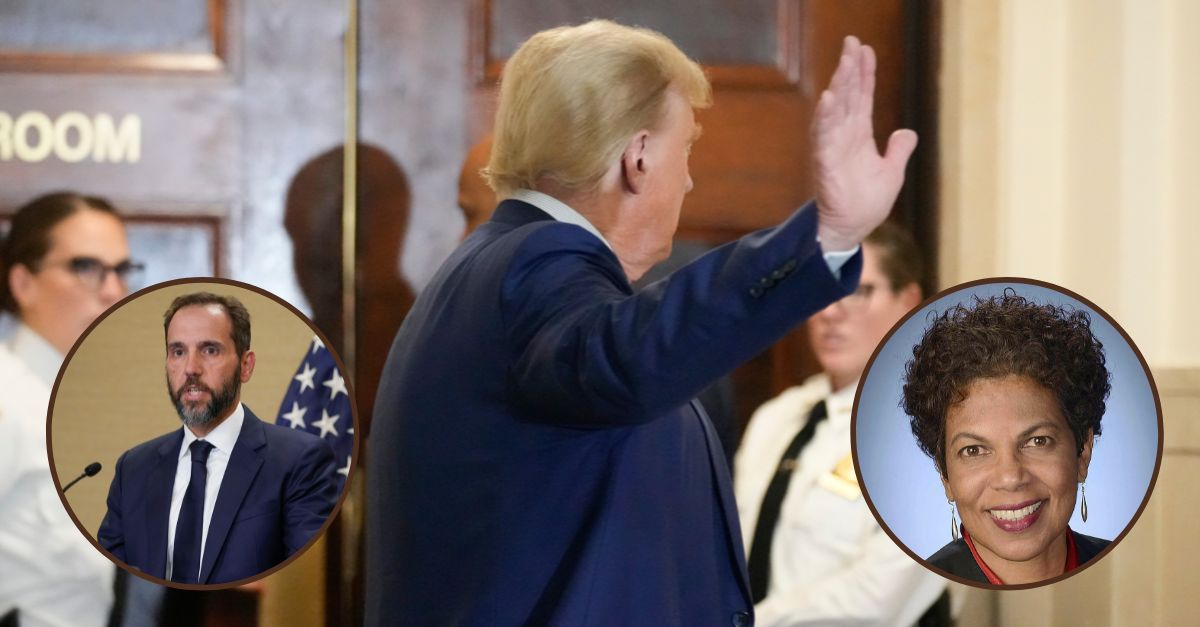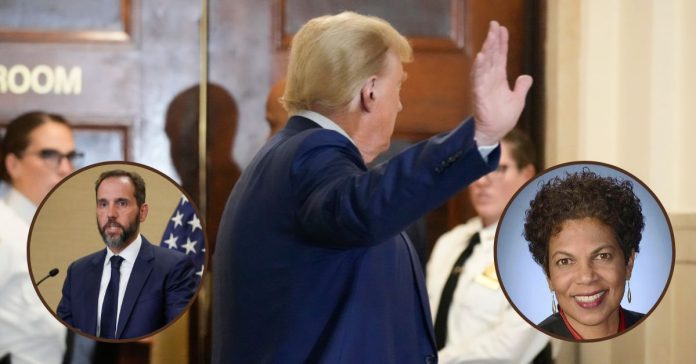
Background: Former President Donald Trump motions as he returns to the courtroom after a break in his civil business fraud trial at New York Supreme Court, Wednesday, Oct. 25, 2023, in New York. The judge in Donald Trump’s civil fraud trial has fined the former president $10,000. The judge says Trump violated a limited gag order barring personal attacks on court staffers.(AP Photo/Seth Wenig)/ Inset left: Special Counsel Jack Smith, AP Photo/J. Scott Applewhite, File)/Inset right: U.S. District Judge Tanya Chutkan. (Administrative Office of the U.S. Courts via AP, File)
In the face of a looming battle in appellate court over whether Donald Trump should be subject to a gag order ahead of his election subversion trial in Washington, D.C., Trump’s attorneys filed their opening brief in the court Wednesday, arguing any gag order imposed would be overly restrictive, unconstitutional and would trigger an “impermissible heckler’s veto” on Trump as he campaigns for the White House in 2024.
Oral arguments are scheduled for Nov. 20 at the U.S. Court of Appeals for the District of Columbia Circuit.
On Nov. 3, the appeals court placed a temporary hold on a narrow gag order that U.S. District Judge Tanya Chutkan initially agreed to place on Trump back on Oct. 16.
That order barred him from making statements that could target prosecutors, witnesses or the court itself. Prosecutors had convinced Chutkan the gag order was necessary by providing her with a series of Trump’s online statements targeting and disparaging prosecutors as well as a court clerk in New York where Trump is facing a civil fraud trial. The judge in that matter has not only gagged Trump and his lawyers but also fined him for violating rules there.
Mindful of his First Amendment rights, Chutkan agreed that Trump could not intimidate or threaten witnesses or other parties to the case but she ruled that he could publicly deride the Justice Department, the trial venue of Washington, D.C., and the nature of the charges themselves as well as the policy of other political candidates running in 2024, like Mike Pence.
When the appeals court placed the hold, or stay, on the partial gag order, Trump’s attorneys said they would seek relief from the U.S. Supreme Court if the appellate panel did not rule in their favor. In the meantime, Trump has been permitted to speak about this case without any restriction.
Over 67 pages, Trump’s attorneys John Sauer, John Lauro, Todd Blanche and Gregory Singer contend that the gag order is a direct violation of Trump’s First Amendment rights as a “leading candidate” for the presidency in 2024.
It is unfair that Trump would be barred from speaking about potential witnesses too, they argue, because others, like Pence, former Attorney General Bill Barr and Chairman of the Joint Chiefs of Staff Mark Milley “routinely make public statements attacking President Trump and his fitness for office, often with specific reference to this case.”
Pence recently dropped out of the race for 2024 on Oct. 28, nearly a week before the appeals court placed a hold on the partial gag order. Barr is not running for president though he has called a second Trump term a “horror show” and Milley recently became the focus of Trump’s ire after the general told The Atlantic he believed Trump would seek revenge if reelected. Milley also said he thought he would be at the top of Trump’s list if he started “throwing people in jail.”
In response, Trump promptly lashed out online at Milley, a prospective witness in the election subversion case. Trump suggested Milley, a decorated member of the U.S. military, was a traitor who should be executed.
In their brief, Trump’s attorneys say this and other social media messages are protected speech.
There were more than a dozen examples cited by prosecutors in their bid to secure the partial gag order, including Trump’s Truth Social post after he was indicted declaring, “IF YOU GO AFTER ME, I’M COMING AFTER YOU!”
This was political speech, Sauer wrote Wednesday, arguing that the former president was addressing so-called “RINOs,” or “Republicans in Name Only.”
Further, “the prosecution did not present any evidence that any prosecutor, potential witness or court staff had experienced any threats or harassment after any of President Trump’s public statements occurring since Aug. 1, 2023, or any evidence that any such individual had felt threatened or intimidated.
On Aug. 16, however, Abigail Jo Shry of Texas was charged with threatening Judge Chutkan. She had called the judge’s chambers on Aug. 5 and threatened to kill anyone who went after Trump.
“If Trump doesn’t get elected in 2024, we are coming to kill you, so tread lightly,” Shry said in a expletive-riddled call.
During a motion hearing in October, defense lawyers suggested that the indictment in Washington, D.C., be adjourned until after the election. Chutkan refused, saying that the court would not “yield to the election cycle.”
Trump’s lawyers say this is unfair and the court failed to “give weight to the fact that President Trump is conducting a political campaign” when she placed the limited gag order on him. She also “gave no consideration to the rights of over 100 million Americans to receive President Trump’s speech as they decide whether to support him in the upcoming presidential election,” Sauer wrote.
“Given its extraordinary nature, one would expect an extraordinary justification for the Gag Order. None exists. The Gag Order rests entirely and wrongfully on a classic heckler’s veto — i.e., the district court’s speculation that President Trump’s audiences might react to his speech with ‘harassment’ or ‘threats’ to prosecutors, witnesses or court staff,” Sauer wrote. “The First Amendment forbids this heckler’s veto and even if it were legally viable — which it is not — no convincing evidence supports it.”
In the roughly 80 days since the indictment was announced, his attorneys said, Trump has made “constant public statements about the case and the people involved” yet the prosecution has been unable to show “actual fact” of intimidation.
Instead, special counsel has relied on violent events from “three years ago,” to make their point.
Prosecutors must show a “clear and present danger to the administration of justice” for the gag to be enforced again, the motion states.
The “carve outs” that the court set, his lawyers argue, make it so that Trump “must guess when criticizing the prosecution” or witnesses. When could Trump know when what he says crosses the line into something that could make up the substance of their testimony, defense attorneys asked.
“All must guess — and all will guess differently,” the motion states.
Meanwhile, back at the U.S. District Court for the District of Columbia, Chutkan late Wednesday issued an order setting a Nov. 22 hearing on why certain redacted documents sought by Trump are not discoverable, according to special counsel.
Chutkan also issued an order Wednesday setting a deadline of Jan. 15, 2024, for him to declare whether he intends on using an advice of counsel defense at his criminal conspiracy trial in March.
Have a tip we should know? [email protected]

